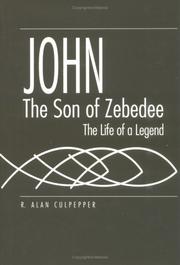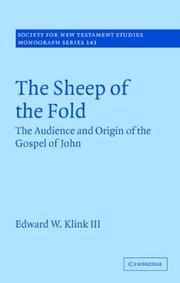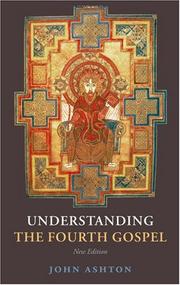| Listing 1 - 10 of 37 | << page >> |
Sort by
|
Book
ISBN: 0813217733 9780813217734 9780813217239 0813217237 0813217458 9780813217451 9780813217338 9780813217345 Year: 2010 Publisher: Washington, D.C. London Catholic University of America Press Eurospan [distributor]
Abstract | Keywords | Export | Availability | Bookmark
 Loading...
Loading...Choose an application
- Reference Manager
- EndNote
- RefWorks (Direct export to RefWorks)
Bible. --- 226.5 --- Evangelie volgens Johannes

ISBN: 0585343276 9780585343273 0872499626 0800631676 9780800631673 Year: 1994 Publisher: Columbia University of South Carolina press
Abstract | Keywords | Export | Availability | Bookmark
 Loading...
Loading...Choose an application
- Reference Manager
- EndNote
- RefWorks (Direct export to RefWorks)
Christianity --- Religion --- Philosophy & Religion --- John, --- Giovanni, --- Hovhannēs, --- Ioann, --- Jan, --- Jean, --- Jehan, --- Johannes, --- Yūḥannā, --- Beloved Disciple --- 226.5 --- Evangelie volgens Johannes
Book
ISBN: 3110185776 9783110185775 3110920565 9783110920567 Year: 2005 Volume: 137 Publisher: Berlin Walter de Gruyter
Abstract | Keywords | Export | Availability | Bookmark
 Loading...
Loading...Choose an application
- Reference Manager
- EndNote
- RefWorks (Direct export to RefWorks)
Die Studie versteht Johannes 6 als eine positive Neuinterpretation des Exodus. Jesus und Moses/Manna werden von Johannes nicht in einen Gegensatz zueinander gestellt. This fresh reading of John 6 as a constructive interpretation of the Exodus story challenges the majority consensus that John set Jesus in antithesis to Judaism.
Allusions in the Bible --- Meaning (Philosophy) --- Biblical teaching --- 226.5 --- Evangelie volgens Johannes --- Allusions in the Bible. --- Philosophy --- Semantics (Philosophy) --- Biblical teaching. --- Bible. --- Criticism, interpretation, etc. --- Meaning (Philosophy) - Biblical teaching --- Exodus. --- Gospel of John. --- New Testament. --- meaning (bible).
Book
ISSN: 05121604 ISBN: 9783161507823 3161507827 1299745598 3161527968 Year: 2013 Volume: 307 Publisher: Tübingen Mohr Siebeck
Abstract | Keywords | Export | Availability | Bookmark
 Loading...
Loading...Choose an application
- Reference Manager
- EndNote
- RefWorks (Direct export to RefWorks)
Hauptbeschreibung Auf dem Weg zu einer ausführlichen Kommentierung des Johannesevangeliums bietet der Band Vorstudien und Aufsätze aus 15 Jahren zur Auseinandersetzung mit den klassischen Modellen der Johannesauslegung, zur Frage nach dem religionsgeschichtlichen Hintergrund und Kontext des Johannesevangeliums, insbesondere seinem Verhältnis zu den Qumran-Texten und zu den synoptischen Evangelien, zum Profil der Adressatengemeinden und zur Interpretation des Bildes der 'Juden' im Johannesevangelium. Weitere Beiträge behandeln die Brotmetapher in Joh 6 und die Bedeutung und Funktion der dualist
Bible --- Criticism, interpretation, etc --- Theology --- 226.5 --- Evangelie volgens Johannes --- Bible. --- Johannesevangelium --- Johannesbriefe --- Frühchristliche Theologiegeschichte --- Studienliteratur --- Neues Testament --- Religion --- Religion / Biblical Studies --- Religion / Biblical Studies / New Testament --- Bible--New Testament.
Book
ISBN: 9780567665300 0567665305 9780567665324 9780567685636 0567665313 0567665321 0567685632 0567695549 Year: 2019 Volume: 549 Publisher: New York : Bloomsbury T&T Clark,
Abstract | Keywords | Export | Availability | Bookmark
 Loading...
Loading...Choose an application
- Reference Manager
- EndNote
- RefWorks (Direct export to RefWorks)
"Michael Whitenton offers a fresh perspective on the characterization of Nicodemus, focusing on the benefit of Hellenistic rhetoric and the cognitive sciences for understanding audience construals of characters in ancient narratives. Whitenton builds an interdisciplinary approach to ancient characters, utilizing cognitive science, Greek stock characters, ancient rhetoric, and modern literary theory. He then turns his attention to the characterization of Nicodemus, where he argues that Nicodemus would likely be understood initially as a dissembling character, only to depart from that characterization later in the narrative, suggesting a journey toward Johannine faith. Whitenton presents a compelling argument: many in an ancient audience would construe Nicodemus in ways that suggest his development from doubt and suspicion to commitment and devotion."--Bloomsbury Publishing.
Characters and characteristics in the Bible --- 226.5 --- 22-05 --- 22-05 Bijbelse figuren --- Bijbelse figuren --- 226.5 Evangelie volgens Johannes --- 226.5 Evangile de S. Jean --- Evangelie volgens Johannes --- Evangile de S. Jean --- Nicodemus --- Bible. --- Jean (Book of the New Testament) --- Johanisi (Book of the New Testament) --- Johannesevangelium --- John (Book of the New Testament) --- Yohan pogŭm --- Yohane den (Book of the New Testament) --- Yūḥannā (Book of the New Testament) --- Criticism, interpretation, etc. --- Ioganaĭ (Book of the New Testament) --- Иоганай (Book of the New Testament) --- Bible
Book
ISBN: 9781628371864 1628371862 9780884142423 0884142426 9780884142416 0884142418 Year: 2017 Publisher: Atlanta SBL Press
Abstract | Keywords | Export | Availability | Bookmark
 Loading...
Loading...Choose an application
- Reference Manager
- EndNote
- RefWorks (Direct export to RefWorks)
"The Gospel of John was written during the period of the emergence of Christianity and its separation from Judaism and bears witness to their contested relationship. This volume contains cutting-edge essays written by an international group of scholars who interpret for students and general readers what the book tells us about first-century Judaism, the separation of the church from Judaism, and how John's anti-Jewish references are being interpreted today"--
Judaism --- Christianity and other religions --- 226.5 --- 226.5 Evangelie volgens Johannes --- 226.5 Evangile de S. Jean --- Evangelie volgens Johannes --- Evangile de S. Jean --- Hellenistic Judaism --- Judaism, Hellenistic --- Jews --- Religions --- Semites --- Relations&delete& --- Christianity --- History --- Religion --- Bible. --- Jean (Book of the New Testament) --- Johanisi (Book of the New Testament) --- Johannesevangelium --- John (Book of the New Testament) --- Yohan pogŭm --- Yohane den (Book of the New Testament) --- Yūḥannā (Book of the New Testament) --- Criticism, interpretation, etc. --- Ioganaĭ (Book of the New Testament) --- Иоганай (Book of the New Testament) --- Relations --- Brotherhood Week --- Christianity. --- Judaism.
Book
ISBN: 9781527543164 1527543161 1527544508 9781527544505 Year: 2020 Publisher: Newcastle upon Tyne, UK Cambridge Scholars Publishing
Abstract | Keywords | Export | Availability | Bookmark
 Loading...
Loading...Choose an application
- Reference Manager
- EndNote
- RefWorks (Direct export to RefWorks)
"Johns Gospel is a particularly difficult text for Jewish-Christian relations. It has been described as both deeply embedded in the Judaism of its day whilst simultaneously giving the strongest sense of separation between Judaism and Christianity. Arguably the most problematic verse is John 8:44, where Jesus tells the Jews that they are of their father, the devil. This verse, as well as other parts of the Fourth Gospel, have been used to justify anti-Semitism for centuries. Cognisant of this shameful history, how should Christians read Johns Gospel with the Ioudaioi (Jewish people) in mind? After reviewing the history of separation and problematic relationships between Christians and Jews down the centuries, Jesus and the Ioudaioi introduces theories of the audience of the Gospel, and surveys interpretative strategies proposed by Jewish scholars of the New Testament, while providing model exegesis for Christians who want to remain true to their faith while being aware of the difficulties this poses for positive relationships between Christians and Jewish people."-- Back cover.
Christianity and other religions --- 226.5 --- 296*82 --- 296*82 Dialoog joden - christenen --- Dialoog joden - christenen --- 226.5 Evangelie volgens Johannes --- 226.5 Evangile de S. Jean --- Evangelie volgens Johannes --- Evangile de S. Jean --- Judaism --- Christianity. --- Christianity --- Religions --- Church history --- Bible. --- Criticism, interpretation, etc. --- Jean (Book of the New Testament) --- Johanisi (Book of the New Testament) --- Johannesevangelium --- John (Book of the New Testament) --- Yohan pogŭm --- Yohane den (Book of the New Testament) --- Yūḥannā (Book of the New Testament) --- Ioganaĭ (Book of the New Testament) --- Иоганай (Book of the New Testament)

ISBN: 9780521875820 052187582X 9780511488023 9780521130448 9780511350108 0511350104 0511349246 9780511349249 1107182271 1281086177 9786611086176 1139132962 0511351003 0511488025 0511348274 0521130441 Year: 2007 Volume: 141 Publisher: Cambridge, UK New York Cambridge University Press
Abstract | Keywords | Export | Availability | Bookmark
 Loading...
Loading...Choose an application
- Reference Manager
- EndNote
- RefWorks (Direct export to RefWorks)
The last generation of gospel scholarship has considered the reconstruction and analysis of the audience behind the gospels as paradigmatic. The key hermeneutical template for reading the gospels has been the quest for the community that each gospel represents. This scholarly consensus regarding the audience of the gospels has been reconsidered. Using as a test case one of the most entrenched gospels, Edward Klink explores the evidence for the audience behind the Gospel of John. This study challenges the prevailing gospel paradigm by examining the community construct and its functional potential in early Christianity, the appropriation of a gospel text and J. L. Martyn's two-level reading of John, and the implied reader located within the narrative. The study concludes by proposing a more appropriate audience model for reading John, as well as some implications for the function of the gospel in early Christianity.
Bible. --- Criticism, interpretation, etc. --- 226.5 --- Evangelie volgens Johannes --- Jean (Book of the New Testament) --- Johanisi (Book of the New Testament) --- Johannesevangelium --- John (Book of the New Testament) --- Yohan pogŭm --- Yohane den (Book of the New Testament) --- Yūḥannā (Book of the New Testament) --- Ioganaĭ (Book of the New Testament) --- Иоганай (Book of the New Testament) --- Arts and Humanities --- Religion

ISBN: 1282732293 9786612732294 0191538175 1435607244 9780191538179 9780199297610 0199297614 9780199544226 1383044201 9781282732292 6612732296 9781435607248 Year: 2007 Publisher: Oxford Oxford University Press
Abstract | Keywords | Export | Availability | Bookmark
 Loading...
Loading...Choose an application
- Reference Manager
- EndNote
- RefWorks (Direct export to RefWorks)
Arguing that the thought-world of the Gospel is Jewish, not Greek, and that the text is composed over an extended period as the evangelist responded to the changing situation of the community, this book offers a partial answer to a key question: how did Christianity emerge from Judaism?
Bible. --- Jean (Book of the New Testament) --- Johanisi (Book of the New Testament) --- Johannesevangelium --- John (Book of the New Testament) --- Yohan pogŭm --- Yohane den (Book of the New Testament) --- Yūḥannā (Book of the New Testament) --- Criticism, interpretation, etc. --- 226.5 --- Evangelie volgens Johannes --- Ioganaĭ (Book of the New Testament) --- Иоганай (Book of the New Testament) --- Bible NT. Gospels. John
Book
ISBN: 9789004462946 9789004462939 9004462937 9004462945 Year: 2022 Publisher: Leiden Brill
Abstract | Keywords | Export | Availability | Bookmark
 Loading...
Loading...Choose an application
- Reference Manager
- EndNote
- RefWorks (Direct export to RefWorks)
"In John within Judaism, Wally V. Cirafesi offers a reading of the Gospel of John as an expression of the fluid and flexible nature of Jewish identity in Greco-Roman antiquity. While many have noted John's general Jewishness, few have given it a seat at the ideologically congested table of ancient Jewish practice and belief. By interrogating the concept of "Judaism" in relation to the complex categories of "religion" and "ethnicity," Cirafesi argues that John negotiates Jewishness using strategies of ethnic identity formation paralleled in other Jewish sources from the Second Temple and early rabbinic periods. In this process of negotiation, including its use of "high christology" and critique of Ioudaioi, John coalesces with other expressions of ancient Jewish identity and, thus, can be read "within Judaism.""--
Judaism --- History of doctrines --- Judaism (Christian theology) --- 226.5 --- 225.08*7 --- 225.08*7 Theologie van het Nieuwe Testament: relatie met het jodendom --- Theologie van het Nieuwe Testament: relatie met het jodendom --- Jews --- Religions --- Semites --- Christianity and other religions --- 226.5 Evangelie volgens Johannes --- 226.5 Evangile de S. Jean --- Evangelie volgens Johannes --- Evangile de S. Jean --- Biblical teaching --- Religion --- Bible. --- Jean (Book of the New Testament) --- Johanisi (Book of the New Testament) --- Johannesevangelium --- John (Book of the New Testament) --- Yohan pogŭm --- Yohane den (Book of the New Testament) --- Yūḥannā (Book of the New Testament) --- Ioganaĭ (Book of the New Testament) --- Иоганай (Book of the New Testament) --- Criticism, interpretation, etc. --- Judaism. --- Biblical teaching.
| Listing 1 - 10 of 37 | << page >> |
Sort by
|

 Search
Search Feedback
Feedback About UniCat
About UniCat  Help
Help News
News